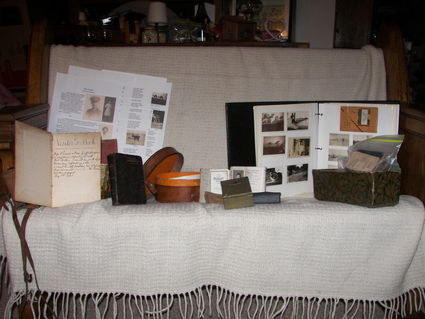Everybody Reads The Record
Last updated 4/21/2010 at Noon
Dear Record Live,
Twenty four years ago I attended an auction and purchased a box of materials that belonged to a soldier killed in World War I. The box was just an ordinary cardboard box, dilapidated, torn and dusty, containing an old bible, some British Legion diaries, a visitor’s book from a boarding house dating to 1906, a soldier’s leather collar box with collars from 1915, some Kodak negative folders and 360 photographs taken by the soldier during WWI with writing on most of them.
I have spent the better part of those years searching for the relatives of that soldier in hope of returning the items, as I couldn’t bear the thought that a young man killed in war would be forgotten because his belongings were separated from his family.
This is a “follow up” on the article you published in January of last year concerning the belongings of that soldier, John Francis Aitken. The article, “Mystery Box, Window to the Past.” was submitted in an attempt to help with my search.
On March 8, of this year, you forwarded to me a letter written by Max and Pam Aitken of Cheshire, England. The couple turned out to be the surviving relatives of John Aitken of Bakewell, England.
Because you published the article, the son of Max and Pam, Jonathan Aitken was able to track me down after finding it on the Internet. Now as a result, I will fulfill my promise to return the belongings to the family, free of any charge.
There was an interesting set of circumstances surrounding the contact with the relatives. Two days before your note was sent, my company, Afton Corp., whose parent company is Newmarket Corp., announced the purchase of a metal-working fluids company called Polartech in Manchester, England. Max and Pam’s home is just on the outskirts of Manchester.
With that in mind and with some reservations, I decided to e-mail the president and CEO of Newmarket Corp., Teddy Gottwald, to ask a great favor. I knew that there would be negotiations between the two companies after the purchase and because I was afraid that if I mailed the belongings to England, they would be lost for another 93 years, I asked that he allow someone to hand carry them to Max and Pam as long as it was not out of the way and wouldn’t be an inconvenience. I attached the newspaper article and requested that before he said “no” to at least read it.
I received a reply that evening stating that it was an amazing story and after a few days of planning, Newmarket and Afton Corps. would make it happen.
Three days later, my first e-mail of the day was from Teddy. The first line read, “Pack your bags, you are going to England.” “I shared your letter with others in the company and we all decided that if anyone should deliver the items, it should be you.” What an honor it is to be able to do this noble thing and what an honorable thing my company is doing to accomplish this most important mission!
In May, I will be traveling to England to deliver the belongings of John Aitken to his family. All paid for by my company because they thought it was just the right thing to do.
It is because of companies like Afton and Newmarket and newspapers like The Record Live that our world is a better place. It is simple things like these gestures of kindness that drive a man like John Francis Aitken to realize that a free life is worth defending, even to the point of an early death.
Though John was a British soldier, he was born in America to British parents. It would make no difference to me had he never set foot on American soil. He, like American soldiers fought so that all countries and people could be free. I would do the same for him as I would do for a soldier wearing an American uniform.
John Aitken lies in a small area, plot I, row G, marker #3 of Brandhoek New Military Cemetery No. 3, near Ypres, Belgium. He lies in Flander’s Fields where the poem of the same name was written in 1915 by John McCrae and in the same place where poppies bloom when the land is disturbed by exploding shells or by the shovels of those who dig the graves of the brave men who died the day before.
It is the blooms of those red flowers that give us hope that soon no more men will be needed to defend us, that the shade of the markers and monuments to the fallen will soon cool the world’s need for war.
Leroy Perego
April 15, 2010
















Reader Comments(0)